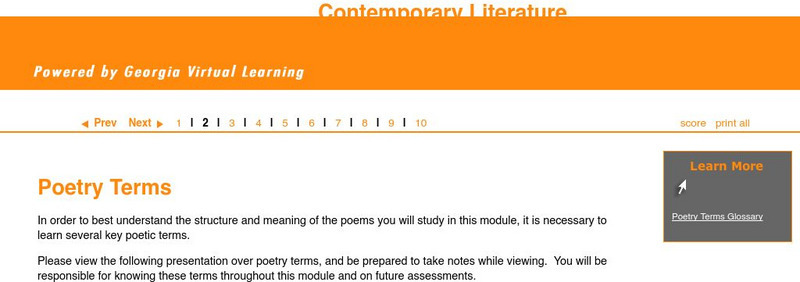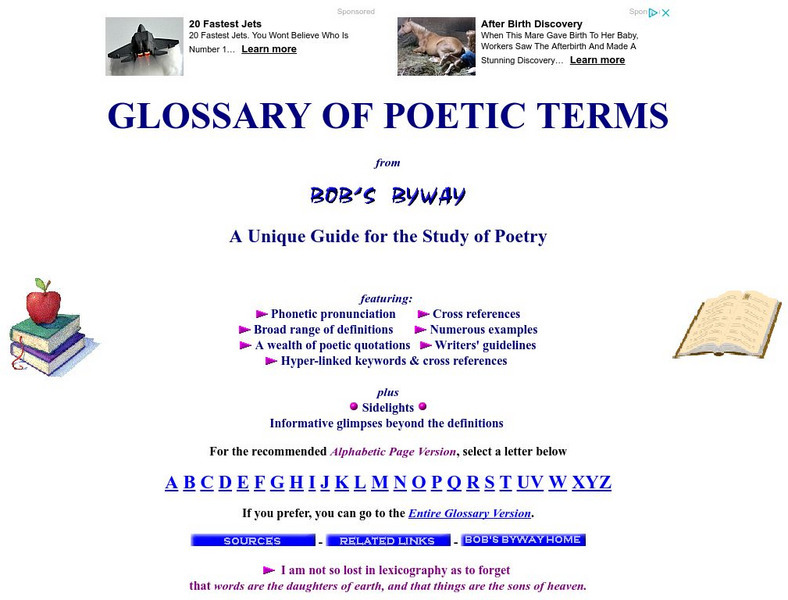Pittford Schools
Literary Devices, Techniques, and Elements
What's the difference between a speaker and an author? What's an example of anthropomorphism? Clarify the meanings of literary devices, elements, and techniques with a comprehensive glossary of terms.
Curated OER
Simile Stories
Fourth graders view song lyrics and identify similes in the song text. In this similes lesson, 4th graders define and identify similes on a worksheet. Students write their own similes using various adjectives.
Curated OER
Rock & Roll through Literary Terms: An Upbeat Lyrical Adventure
Students participate in a variety of activities surrounding Rock & Roll music, lyrics, drama and visual art and how they all help demonstrate examples of literary terms. They use Rock & Roll as an effective aid to stimulate their...
Curated OER
Haunting Music
Young scholars discover music that was inspired by the spooky and bizarre. For this music of Hector Berlioz and Camille Saint-Saens lesson, students identify elements of music and listen to the Symphonie Fantastique and Danse...
Curated OER
Clash of the Titans Lesson Plans
The new movie "The Clash of the Titans" is a great way to learn about film making and Greek Mythology.
Curated OER
Identifying Figurative Language
In this figurative language activity, students identify figurative language in the sentences and explain their answers. Students complete 10 problems.
Curated OER
The Stinky Cheese Man and Other Fairly Stupid Tales
Sixth graders demonstrate the ability to process and evaluate content from a variety of sources and apply comprehension skills to the material read. They organize information for practical use and design and develop an informational...
Curated OER
Reading Comprehension Too
In this reading comprehension worksheet, students write sentences with forty five given words. They think about what each conveys and when it could be used.
Curated OER
Literary Terms
In this language arts instructional activity, students 21 look for words having to do with types of literature and literary elements. Students may self correct by selecting the link at the bottom of the page.
Other
Poetry4 Kids: Poetry Lessons
This resource offers guidance through the writing process of writing funny poetry. There are instructions on how to write a clerihew and an exaggeration poem.
Texas Education Agency
Texas Gateway: Hyperbole and Understatement (English Ii Reading)
[Accessible by TX Educators. Free Registration/Login Required] In this lesson, you will learn to recognize hyperbole and understatement in nonfiction. Good examples also appear in other forms of writing such as fiction and poetry, but we...
E Reading Worksheets
E Reading Worksheets: Figurative Language Poems With Questions
This learning module provides remediation and extra practice with identifying figurative language techniques in the context of poems. Nine different worksheets are available to help reinforce the concept of figurative language in poetry.
Georgia Department of Education
Ga Virtual Learning: Contemporary Literature: The Modern Poet: Poetry Terms
This is a poetry terms presentation which defines poetry terms.
Alabama Learning Exchange
Alex: Poetry and Music Fun With Chris Daughtry
This language arts lesson grabs students' attention by incorporating a popular musician. The lyrics to "Over You" include vivid language that makes identifying figures of speech intriguing. The students will identify similes, metaphors,...
Sophia Learning
Sophia: Hyperboles
This tutorial focuses on the use of hyperbole; it defines the term and explains when it is used. It offers two video clips: the first demonstrates the use of hyperbole in song lyrics as it highlights them, and the second shows the use of...
Texas Education Agency
Texas Gateway: Understatement/overstatement (English I Reading)
A learning module that teaches students to recognize hyperbole and understatement as literary devices in five modules: Introduction, Recognizing Hyperbole and Understanding Its Purpose, Identifying Hyperbole in Poetry, Recognizing...
Love To Know Media
Your Dictionary: Literary Terms Lesson Plan
This is a lesson plan for teaching the seven literary terms used in poetry: simile, metaphor, alliteration, imagery, hyperbole, personification, and onomatopoeia.
Other
Fu Jen Univ.: Poetic Elements: Denotation and Connotation: Figures of Speech
This site gives short definitions of the terms denotation and connotation. Also gives definitions for many figures of speech. Finally, includes discussion and study questions for a few poems at the bottom of the page. L.11-12.5b Nuance
Virtual Salt
Virtual Salt: A Glossary of Literary Terms
This site provides a long list of literary terms complete with full definitions and examples.
E Reading Worksheets
E Reading Worksheets: Figurative Language: Shakespeare
This learning module provides remediation and extra practice with identifying figurative language techniques found in excerpts written by William Shakespeare. A worksheet is available to help reinforce the concept of figurative language...
E Reading Worksheets
E Reading Worksheets: Figurative Language Activities
Numerous activities, games, quizzes, lessons, and PowerPoint presentations are provided for the topic of "figurative language" in writing. Students will have numerous exposures to examples. Students will also be able to practice...
ClassFlow
Class Flow: Proverbs
[Free Registration/Login Required] In this flipchart the student identifies the characteristics of various genres and produces evidence of reading that responds to and analyzes the effects of sound, figurative language, and graphics in...
Other
Bob's Byway: Glossary of Poetic Terms
Calling itself "unique," Bob's is easy to use, with cross-links throughout, phonetic pronunciation guides when necessary, and many examples and quotations. Click on the letter and scroll for the word.
Ted Nellen
Cyber English (By Ted Nellen): Literary Terms F R
The second of three pages of simple definitions for literary terms. This page, F - R, covers forty-seven terms from "Fable," to "Romance."






















